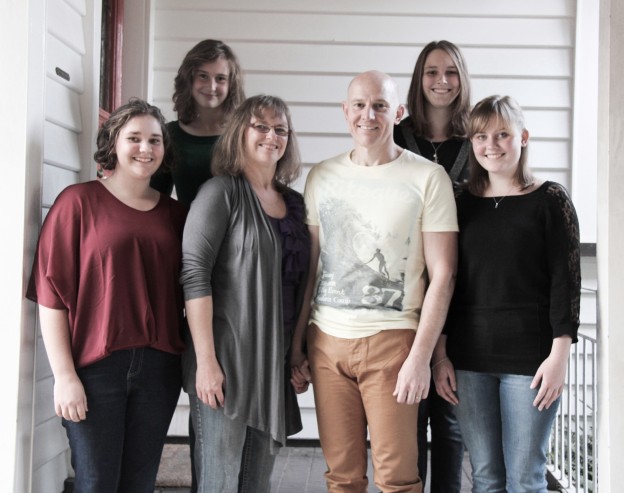Series introduction: Family worship doesn’t save; only Jesus can do that. But I’m convinced that the practice of coming together as a family to worship God in the home is sorely needed in our homes today. Because there’s no specific to-do list in the Bible about family worship, I’ve struggled this year to work out what it looks like for us when I’m leading my own growing family.
To encourage myself and others about this, I’ve interviewed a few families that Cheryl and I respect and look up to, learning from them what they do, what they don’t, how they struggle, how they persevere with intentionally leading their families to know and love Jesus Christ.
——————-
I first met Paul Davison when he was invited to our church’s first annual conference. He gave a seminar called “Applying the Gospel to Parenting” that at the time I thought “interesting”, but promptly forgot (only to find out we were expecting a year later!)
I’ve since learned that he is the senior pastor at Hastings Baptist Church, and bumped into him a few times in the next few years at conferences like STAND and YLC/Equip. Over the years when we’ve been in Hastings we try to visit their church, and usually the family have graciously offered to host us for lunch afterwards. I was personally struck by how their children (teenage to uni-aged) talk freely around the dining table, and were able to actively and naturally discuss the Sunday message.
Paul was kind enough to answer a few questions about their family routines.
1. Tell us a bit more about your family.
Joy and I have been married for 26 years and have four daughters aged 19, 17, 16, 14. My eldest started University this year, with #2 due to head off there as well next year. We’ve done home schooling, Christian schooling and state schooling.
2. For many of us this is not something we’re familiar with. Tell us what family worship looks like for you.
I’m stumbling over the word “worship” in the question. I think a more helpful word would be “training”. I understand that the purpose of this topic is about a specific time/session of family Bible reading etc., but that needs to take its place inside the bigger category of training my children in the gospel and godliness. That all-of-life perspective means that it is a 24/7 parental responsibility to be living out and speaking about the gospel with my children.
It means that I am not trying to make a short Bible study around the dinner table bear all the weight — but rather it is one part, alongside our involvement in church, a commitment to resolving relationship issues in a godly way, learning to apologise as a parent, teaching my children to pray, guiding them in friendships, interpreting and explaining the world/media/magazines/books etc. to my children. All of that is training my daughters.
3. Good point! So what does a specific time of family training look like in your house? Please describe it for us.
So inside the bigger picture of training my children, we’ve adopted a pattern of reading a short section of the Bible after dinner. Typically, I read a section and then ask some basic comprehension questions and one or two application questions.
Often I try to push or prod at typical “Sunday school” answers — rote answers — reflex answers. For example, I might ask my children: “So does that mean good people go to hell and bad people go to heaven?” – that makes them think, and qualify their answers.
Then we pray — one idea/request each. Perhaps something from the passage/text (e.g. a promise, a command) or perhaps for a person in need.
We spend about 10 minutes or so all up. Sometime the discussion goes longer… but that’s because they are interested. Better short and sweet, than long and sour!
4. Did your parents practise any sort of family training/discipleship when you grew up?
Both Joy and I come from essentially non-Christian homes, so we find ourselves as first-generation trainers… learning how to do the best we can. I hope our daughters will improve on our efforts.
5. What convinced you to intentionally train your children at home? Isn’t it something the church is better equipped to do?
Training my children is a God-given responsibility. Church, Sunday School, Youth Group can all help… but the Bible says it’s the job of parents. In the end the Lord will have to open the hearts of my children for them to be saved — I can’t do that for them. But the normal means that the Lord uses to accomplish that is parents faithfully teaching their children God’s word.
I also know that outside my home is a vast spiritual wilderness through which the great majority of children in our culture will end up knowing almost nothing about Christ — so everything I do as a parent is by comparison a spiritual help to my children.
6. Have you done these things the same way since you started? If you could start again what might you do differently?
What you can do with your children will change over time. We did more Bible stories when they were small, acting them out etc. As they become older, you have to re-invent what you do.
As my children got older, I wasn’t just teaching them the stories, I was teaching them how to read the Bible — good and bad methods of interpretation, encouraging them to see the structure the layout, the movement; how to read the OT patterns and promises and see the NT connections and fulfilment.
We’ve concentrated on the Bible, which has probably meant we have been a bit weak on Systematic Theology — connecting the dots on a topic or issue. Other families that work through a catechism will be stronger there than us.
One mistake has been to set the pace by the oldest child, and then think we’re done when they leave home… forgetting that youngest still needs to experience what the eldest got at the same age. It’s a balancing act making the conversation work for an 18 year old and a 12 year old.
7. How do you fit all this into your schedules? What happens when you forget/get too busy?
Because we have a pattern of sitting at the table for dinner that creates an opportunity. We’ve aimed for regularly reading the Bible at the table; we haven’t aimed for unfailing reading the Bible.
You start with the best of intentions, then something changes — the children, the circumstances, the season — and you realise that we haven’t read the Bible at the table for a week or two. Oops! You just start again. It’s not one of the Laws of the Medes and Persians… you just do your best.
8. Do you use the Bible, or other books?
Occasionally I’ve used devotional readers and family guides. But for us it has been best when we have just read the Bible.
9. What advice would you give to someone wanting to intentionally disciple their children but intimidated by it all?
Keep your pretensions low and your attainment high, that’s a recipe for humble progress. But if you have high pretensions and low attainment, that’s a recipe for hypocrisy — and your children will see it.
Your children know exactly what you are like. You might bluff your way through one evening — but not their whole childhood! Admit your limitations, weakness, biases… and work against them as best you can. Don’t pretend to be holy for 10 minutes at the dinner table.
See all this as just one part of the repertoire of training your children – again, it is a 24/7 parental responsibility to be living out and speaking about the gospel with my children.
10. Any encouragement you could give us looking from the other side? (Eg with your daughters heading off to uni and continuing to walk in faith?)
Our goal as parents is not producing “godly” children; our goal is to raise adults who will take their place in God’s world. It is important to keep an eye on the end goal, even while you grind away day today.
While I know that godly parents don’t always raise children who share their faith (1 Samuel 8:3), I am grateful that my children have a good grasp of the gospel and what personal commitment to Christ means. The perseverance and the prayers of parents are part of the normal means that the Lord uses to draw children to follow him.
——————-
Other posts in this series:




